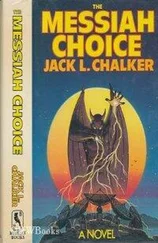Jack Chalker - Ghost of the Well of Souls
Здесь есть возможность читать онлайн «Jack Chalker - Ghost of the Well of Souls» весь текст электронной книги совершенно бесплатно (целиком полную версию без сокращений). В некоторых случаях можно слушать аудио, скачать через торрент в формате fb2 и присутствует краткое содержание. Год выпуска: 2000, ISBN: 2000, Издательство: Del Rey / Ballantine, Жанр: Фантастика и фэнтези, на английском языке. Описание произведения, (предисловие) а так же отзывы посетителей доступны на портале библиотеки ЛибКат.
- Название:Ghost of the Well of Souls
- Автор:
- Издательство:Del Rey / Ballantine
- Жанр:
- Год:2000
- ISBN:0-345-39485-2
- Рейтинг книги:4 / 5. Голосов: 1
-
Избранное:Добавить в избранное
- Отзывы:
-
Ваша оценка:
- 80
- 1
- 2
- 3
- 4
- 5
Ghost of the Well of Souls: краткое содержание, описание и аннотация
Предлагаем к чтению аннотацию, описание, краткое содержание или предисловие (зависит от того, что написал сам автор книги «Ghost of the Well of Souls»). Если вы не нашли необходимую информацию о книге — напишите в комментариях, мы постараемся отыскать её.
Ghost of the Well of Souls — читать онлайн бесплатно полную книгу (весь текст) целиком
Ниже представлен текст книги, разбитый по страницам. Система сохранения места последней прочитанной страницы, позволяет с удобством читать онлайн бесплатно книгу «Ghost of the Well of Souls», без необходимости каждый раз заново искать на чём Вы остановились. Поставьте закладку, и сможете в любой момент перейти на страницу, на которой закончили чтение.
Интервал:
Закладка:
It took them three days to reach the border, lazily testing out their new abilities, exploring the region, and resting in small towns along the way. Things had sufficient sameness so that Ming began to wonder how they would know that they’d crossed the border at all.
She needn’t have worried.
All the senses save sight saw it as a massive brick wall. No matter how wide the spray, sonar bounced off it and gave the impression of a monstrous structure that was both solid and impenetrable. The magnetic-field sense showed it as a single solid shield. There was yet another sense—that the border was a static electromagnetic field.
But sight showed that it was not solid, but some sort of energy barrier. They could see through it, but there seemed little to see. It looked dark and murky, and if there was anything solid beyond, it was blurred and indistinct.
A small Customs station sat on a narrow rock outcrop at the end of the fluorescent “road” they had been following. Clearly, the route and the lighting stopped there, in a small boxy structure that probably provided its initial power. They discovered that the other building was a small inn and Customs processing center combined. Of course, they could easily penetrate the border at routes not covered by these stations, but non-Kalindans stuck out like sore thumbs. They couldn’t buy anything or rent a room or even get a ticket without valid encoded visas. They saw that the place was deliberately overly bright on the “wall” side, probably so that anyone coming into the country would see it. Above, other “roads” for more elaborate and motorized traffic converged onto a much larger center.
Yabbo was a semitech hex; no one could use the sleek electric scooters beyond this point, or the big fusion rigs that moved heavy freight.
Doesn’t look like theres a similar station on the other side of the barrier or whatever that thing is, Ari noted. I wonder if Yabbo is as bureaucratic?
Depends on what the hell they are, Ming responded pragmatically. Besides, steam engines wouldn’t be much use down here.
That was true, although there were a lot of other things that could be done in a semitech hex, even underwater. Many of the underwater semitech hexes were said to have substantial volcanic activity, for instance, which could be harnessed.
It was in the Customs house that they saw their first Yabban, and they were definitely—different.
It had an exoskeleton, which glowed from some inner light and yet seemed transparent. They could have sworn they were looking at a smudged or unclear X ray. The creature had long, thin, plierlike claws in front that appeared to be mounted on natural ball joints and seemed to be able to turn any which way; the claw itself could also revolve as needed around its wrist joints. Four long, spindly legs, two on each side, were in back of the claws. At the rear, on each side of the back end, was an incongruous-looking pair of flippers. The head seemed nothing more than two independent eye stalks, and beneath them was a round orifice filled with what seemed to be constantly writhing little tentacles, although a close look showed two gill slits on either side.
There were others in the Customs station, and so they could see two Yabban types. One was slightly smaller than the other, and had a translucent waving membrane on top of the head which changed color through a series of pastel hues. Clearly two sexes, although which sex was which was impossible to tell.
“I have been dealing with the Corithian Sons Company since I apprenticed my trade,” a Yabban was saying to a Kalindan Customs officer as they drew closer. Ari and Ming had seen pictures and gotten a basic briefing on all the neighboring hexes, but that wasn’t the same as seeing a Yabban in the flesh. At least after all that time with the other races in South Zone, the odd workings of the translator modules no longer seemed strange. The Yabban sounded just like a Kalindan to them, even though they could not imagine where any conversational sounds could emerge from it.
Maybe they didn’t. Who knew what Yabbans actually sounded like to each other?
“I know, I know,” the Customs officer responded, sounding exasperated. “You are a well-known trader, Citizen Slagha. But pending clearance from the Security Service, I must hold you and your family here. It is nothing aimed at you; it is everybody who is going through this. We are having a serious problem at the moment and we must take extra precautions.”
“Indeed?” the Yabban snapped, those thousands of little tentacles around its mouth almost frenzied in pulsing movement. “And what of my customers? We cannot make the level of refined tubing we require, and a whole new subdivision is awaiting the shipment. Suddenly nothing is going out or coming in without going through this horror of a bureaucracy!”
“I’m so very sorry, but it’s the war, you know—”
“Don’t give me that!” the Yabban snapped. “That skirmish is over anyway!”
Ari and Ming decided not to dwell on the conversation but rather to go into the small, nearby cafe and get the gossip from Kalindans who were coming back home via this road house. It was odd how quickly and easily “us” meant the leathery-skinned reptilian mer-people and how everybody else had become “them.”
It didn’t take long to get a general picture of where they were going. There were no roads in the Kalindan sense, but Yabbans had laid out a series of markers using a grid system that could be “read” by the magnetic “sixth” sense. The numbers and directional signals would tell how far one was from anyplace in the hex and also the direction to go for major habitation.
The water was said to be far warmer and the sea floor on the whole much shallower than Kalinda’s, although there were a few narrow “deeps” which the Yabbans reserved for their own use and which they guessed might have something to do with reproduction. It was suggested that all Kalindans stay away from the deeps. If they proved unavoidable, they should be crossed quickly and at a high level.
There were plenty of nutrients in the water, and the microscopic plants and tiny animals were filling, if not very interesting to a Kalindan. There was a lower oxygen content in the water, but not enough to cause serious problems.
Other than that, the Yabbans tended to be fairly friendly if visitors didn’t abuse their hospitality or overstay a welcome. Their rear flippers gave them tremendous sprinting abilities, but they preferred walking across the bottom. Essentially vegetarians, they had long ago gotten rid of the predators that once stalked the area.
Politically, they were a nation of large families, or clans, with a hierarchical structure based on age. There were no old age homes. When a Yabban became mentally feeble, there was a great clan ceremony. The ranking Elder who was no longer capable was taken in, slain, and ritually eaten by his or her clan. It was the only meat they ever ate and, it seemed, the only kind they could digest. It was a sobering end; from lord to lunch.
I don’t find growing old in that society to be very fulfilling, Ari commented.
Appetizing, though, Ming shot back. If you ve got the stomach for it.
Their next step was to cross over into the hex. They wondered if Chalidang activity would be as conspicuous in such a place as they would be.
A friendly salesman gave them a fair route map marked with the main city centers, as well as a decent route to the capital city of Abudan. It also noted the deeps and ways around them—and, interestingly, some large cautionary zones.
“Volcanoes,” the salesman explained. “They’re quite active in Yabbo. That’s what makes things so rich and also provides a lot of comforts. You’ll see. And don’t worry, you won’t be surprised by them—you’ll know where not to go without anybody having to yell!”
Читать дальшеИнтервал:
Закладка:
Похожие книги на «Ghost of the Well of Souls»
Представляем Вашему вниманию похожие книги на «Ghost of the Well of Souls» списком для выбора. Мы отобрали схожую по названию и смыслу литературу в надежде предоставить читателям больше вариантов отыскать новые, интересные, ещё непрочитанные произведения.
Обсуждение, отзывы о книге «Ghost of the Well of Souls» и просто собственные мнения читателей. Оставьте ваши комментарии, напишите, что Вы думаете о произведении, его смысле или главных героях. Укажите что конкретно понравилось, а что нет, и почему Вы так считаете.












